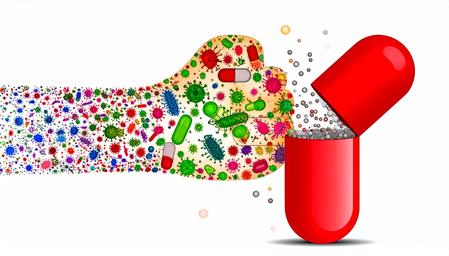Science
IIT Madras Innovates Affordable Device for Rapid Antibiotic Testing

Researchers at the Indian Institute of Technology Madras (IIT Madras) have developed a groundbreaking, low-cost microfluidic device capable of rapidly determining bacterial resistance to antibiotics. This innovative tool, known as ‘ε-μD’, can deliver results in just three hours, providing a much-needed solution in the fight against antimicrobial resistance (AMR).
Antimicrobial Susceptibility Testing (AST) is crucial for identifying which antibiotics will effectively treat specific infections. This process is vital for ensuring that doctors can prescribe appropriate treatments while preventing the misuse of antibiotics, a significant factor contributing to the rise of AMR. Traditional AST methods are often labor-intensive and can take up to 72 hours to provide results, potentially leading to the inappropriate use of broad-spectrum antibiotics.
The new device leverages screen-printed carbon electrodes integrated into a simple microfluidic chip, making it both economical and easy to deploy in smaller clinics and rural healthcare centers. Unlike many existing technologies that require expensive materials and specialized technicians, the ‘ε-μD’ device streamlines the testing process significantly.
Prof. S Pushpavanam from the Department of Chemical Engineering at IIT Madras highlighted the device’s potential impact, stating, “The device can make a real impact on patients in Intensive Care Units, who may be suffering from complications due to bacterial infections. This will help the doctors prescribe the right treatment and can be life-saving.”
Antimicrobial resistance is an urgent global health challenge. According to the World Health Organization (WHO), AMR ranks among the top ten threats to global health, with estimates indicating that nearly 4.95 million deaths worldwide in 2019 were linked to bacterial AMR.
The researchers published their findings in the Nature Scientific Reports journal, detailing how the device was tested on two strains of bacteria: gram-negative E. coli and gram-positive B. subtilis. They evaluated the device’s effectiveness using two antibiotics with distinct mechanisms: ampicillin, which kills bacteria, and tetracycline, which inhibits their growth. The results confirmed the device’s capability to detect both types of bacterial responses within three hours.
In addition, the team successfully tested the device on urine samples spiked with E. coli, demonstrating its ability to identify resistance to tetracycline. This finding emphasizes the device’s potential utility in clinical diagnostics, particularly in settings where rapid testing is essential for patient care.
The introduction of the ‘ε-μD’ device represents a significant advancement in the field of antibiotic resistance testing. Its affordability and speed could transform how healthcare providers approach treatment decisions, ultimately improving patient outcomes and addressing the pressing issue of antimicrobial resistance.
-

 World5 months ago
World5 months agoSouth Korea’s Foreign Minister Cho Hyun to Visit China This Week
-

 Business5 months ago
Business5 months agoStarling Bank Plans Secondary Share Sale, Targeting $5.4 Billion Valuation
-

 Top Stories5 months ago
Top Stories5 months agoMunsang College Celebrates 100 Years with Grand Ceremony
-

 World5 months ago
World5 months agoPAS Aims to Expand Parliamentary Influence in Upcoming Election
-

 Business7 months ago
Business7 months agoKenvue Dismisses CEO Thibaut Mongon as Strategic Review Advances
-

 Lifestyle6 months ago
Lifestyle6 months agoHumanism Camp Engages 250 Youths in Summer Fest 2025
-

 Sports6 months ago
Sports6 months agoDe Minaur Triumphs at Washington Open After Thrilling Comeback
-

 Sports7 months ago
Sports7 months agoTupou and Daugunu Join First Nations Squad for Lions Clash
-

 Top Stories7 months ago
Top Stories7 months agoColombian Senator Miguel Uribe Shows Signs of Recovery After Attack
-

 World7 months ago
World7 months agoASEAN Gears Up for Historic Joint Meeting of Foreign and Economic Ministers
-

 Health6 months ago
Health6 months agoNew Study Challenges Assumptions About Aging and Inflammation
-

 Business7 months ago
Business7 months agoOil Prices Surge Following New EU Sanctions on Russia









